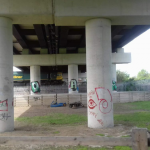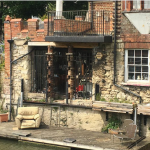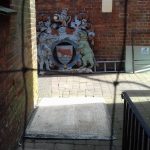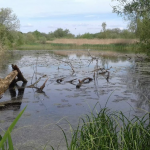Psychogeographer, Dr Robert M. Francis reflects on his application of Guy Debord’s theory and ‘the art of getting lost’ during his residency in Oxford and aligns the practice with Waugh’s pilgrimage – like exploration of the world, as captured in his travel writing texts such as Holy Places and Remote People.
For a while now, I’ve referred to psychogeography as ‘the art of getting lost’, and it’s this I’ve been doing a lot of so far during this residency; deliberately getting lost as a way of uncovering the overlooked and as a means to understand this place on my own terms. The term was first coined by Situationist Guy Debord, who was interested in “drifting” through the urban environment as a way of unpicking the power it might hold over everyday lives. The focus here is on travelling aimlessly, going without purpose, but paying keen attention to one’s moods, psychic reactions and feelings as the changing landscape casts its charm.
Will Self, psychogeographer-extraordinaire, referred to the Situationists as ‘a group of insufferably pretentious French Marxists’. He was probably correct. That said, even if we remove the anti-capitalist stance of reclaiming the consumerist power structures of our spaces, there is still much to gain from the practice. We move in the same ways day after day and week after week – moving to work, home, the homes of family and friends – our landscapes have been designed to help facilitate this utilitarian movement. We lose so much of the potency of place in doing this. I say, get lost. I say, go down roads, lanes and alleyways you’ve never been down before. Go by bike, bus, hopping even – anyway that takes you out of the mundane and everyday and forces you think about you and your locale in different, idiosyncratic ways. The psychogeographer travels without functional purpose – armed with curiosity and a magpie-esque attention to the genius loci.
This practice is similar to ideas of pilgrimage; Iain Sinclair, said as much about his London Orbital walk around the M25; linking the exercise with Romantic ideas of walking out of the knowable and safe, in search of the sublime. For pilgrims, walking to and around a sacred site is an act of understanding the connections between the self, the collective, our physicality and the spiritual. It is a walking-prayer. Something Evelyn Waugh, in his later catholic phase, would have appreciated, and, whether conscious of it or not, a practice he undertook in his travel writing. In texts such as Holy Places and Remote People, Waugh leads the reader through the desolate grounds and unusual byways, as well as places rich with more traditional forms of history and culture. The same can be said about the people Waugh introduces us to – we hear from colonialist and colonised, aristocrat and serf, tribal elder and market trader. It’s this fusion of voices and perspectives that bring about such fascinating detail and peculiar literary topography.
What this leads to in my writing practice is searching out what others leave unnoticed. To find the spirit of a place in its edgelands and its liminal locations. There is rich and untapped narrative, history, oddness and allure in a disused bus stop and graffiti strewn telephone box. I’ve had success in the past aiming this lens on my own neck of the woods – Dudley and the Black Country – and so far, this residency is proving just as fruitful. I’ve found discarded and rotten boats under bridges where tourists and dog walkers amble. The same place where the Saxon remains of Oxfenaforda can still be touched, where drunks leave their litter, where young lovers hide from the rain, where moorhens defend nests with vitriolic rage, where our very own Evelyn and his gang at the Hypocrites Club revelled.
I’ve got more drifting to do as my weeks here continue. I welcome all those reading this to join me. I invite you to undertake your own drifts too – and tell us all about them through our social media channels. As poet, Ian Duhig said when thinking about this subject; ‘you have nothing to lose, but your certainties’.





 Subscribe to gboland's posts
Subscribe to gboland's posts
Comments are closed, but trackbacks and pingbacks are open.